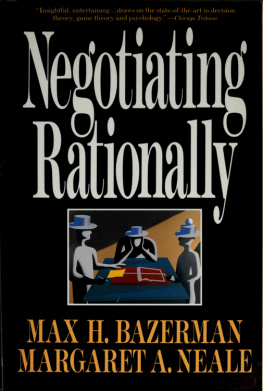Negotiating rationally
Bazerman, Max H
Neale, Margaret Ann
This book was produced in EPUB format by the Internet Archive.
The book pages were scanned and converted to EPUB format automatically. This process relies on optical character recognition, and is somewhat susceptible to errors. The book may not offer the correct reading sequence, and there may be weird characters, non-words, and incorrect guesses at structure. Some page numbers and headers or footers may remain from the scanned page. The process which identifies images might have found stray marks on the page which are not actually images from the book. The hidden page numbering which may be available to your ereader corresponds to the numbered pages in the print edition, but is not an exact match; page numbers will increment at the same rate as the corresponding print edition, but we may have started numbering before the print book's visible page numbers. The Internet Archive is working to improve the scanning process and resulting books, but in the meantime, we hope that this book will be useful to you.
The Internet Archive was founded in 1996 to build an Internet library and to promote universal access to all knowledge. The Archive's purposes include offering permanent access for researchers, historians, scholars, people with disabilities, and the general public to historical collections that exist in digital format. The Internet Archive includes texts, audio, moving images, and software as well as archived web pages, and provides specialized services for information access for the blind and other persons with disabilities.
Created with abbyy2epub (v.1.7.0)
Insiglitful, entertaining...draws on the state-of-the-art in decisiontheory, game theory and psychology.''Chicago Tribune
MAX H. BAZERMANMARGARET A. NEALE
Credits
Grateful acknowledgment is made to the authors and publishers whohave granted permission to reprint the following:
Pages 18-19: Illustrations from Max H. Bazerman, Judgment in Manage-rial Decision Making, 84-85. Copyright 1990 John Wiley & Sons, Inc.Reprinted by permission of John Wiley & Sons, Inc.
Page 25: Auditing problem from Edward J. Joyce and Gary C. Biddle,"Anchoring and Adjustment in Probabilistic Inference," Journal ofAccounting Research {Saving 1981), 123. Copyright 1981 University ofChicago Press.
Page 27: Figure 4.1 from G. B. Northcraft and Margaret A. Neale,"Experts, Amateurs, and Real Estate: An Anchoring and AdjustmentPerspective on Property Pricing Decisions," Organizational Behaviorand Human Decision Processes 39 (1987), by permission of AcademicPress.
Pages 33-34: Asian disease problem from A. Tversky and D. Kahneman,"The Framing of Decisions and the Psychology of Choice," Science, 411,40 (1981), 453-63. Copyright 1981 by the American Association forthe Advancement of Science.
Page 36: Table 5.1 from D. Kahneman, J. L. Knetsch, and R. Thaler,"Experimental Tests of the Endowment Effect and Coase Theorem,"Journal of Political Economy, in press. Copyright University of ChicagoPress.
Page 51: Figure 7.1 from W. Samuelson and M. H. Bazerman, "Negotia-tion Under the Winner's Curse," in V. Smith, ed.. Research in Experi-mental Economics, vol. 3 (Greenwich, Conn.: JAI Press, 1985).
Page 111: Figure 12.1 from S. Ball, M. H. Bazerman, and J. S. Carroll,"An Evaluation of Learning in the Bilateral Winner's Curse," Organiza-tional Behavior and Human Decision Processes 48 (1991), by permissionof Academic Press.
To Beta Mannix, Greg Northcraft,Leigh Thompson, Kathleen Valley, and Sally White,who have been excellentcolleagues and friends
Contents
Preface vii
Acknowledgments xi
1 Introduction to Rational Thinking in Negotiation 1
PART ONE
Common Mistakes in Negotiation
2 The Irrational Escalation of Commitment 9
3 The Mythical Fixed-Pie 16
4 Anchoring and Adjustment 23
5 Framing Negotiations 31
6 Availability of Information 421 The Winner's Curse 498 Overconfidence and Negotiator Behavior 56
PART TWO
A Rational Framework for Negotiation
9 Thinking Rationally about Negotiation 67
10 Negotiations in a Joint Venture: A Case Example 77
11 Rational Strategies for Creating IntegrativeAgreements 89
vi Contents
PART THREE
Simplifying Complex Negotiations
12 Are You an Expert? 105
13 Fairness, Emotion, and Rationality in Negotiation 776
14 Negotiating in Groups and Organizations 726
15 Negotiating Through Third Parties 140
16 Competitive Bidding: The Winner's Curse Revisited 152
17 Negotiating Through Action 760
18 Conclusion: Negotiating Rationally in an IrrationalWorld 777
Notes 777
Index 192
Whether you run a corporation, buy a used car, or sometimesdisagree with a colleague or your spouse, you need to know how tonegotiate. As recently as ten years ago, however, negotiationcourses were rarely taught in management schools or executiveeducation programs; now, they're some of the most sought-aftercourses across the country. At the J.L. Kellogg Graduate Schoolof Management at Northwestern University, negotiation is themost popular course in both our MBA and executive programs.Current and future managers want to know how to get betterresults in negotiationthey want to know how to negotiate morerationally.
A large number of diverse researchers have studied negotiation,and their work has profoundly affected this book. In addition,we've devoted our own research and teaching over the last decadeto helping managers and executives make more rational decisionsand attain far stronger outcomes. We've had over ten thousandparticipants in our programs, and they've helped us understandthe changing social and organizational environment they facetoday and target the problems they must deal with.
We analyzed both how these professionals negotiate rationallyand the common reasons why they don't and found amazingconsistency in the errors that bright executives make. We'vesummarized why managers make these errors, and how you canavoid them to become a more rational negotiatornot just whileyou read the book, but for the rest of your life.
Why is negotiation attracting such attention? Why have nego-tiation courses become so popular in the last decade? One answeris that recent social and economic changes have made goodnegotiating skills not just more important, but more difficult tomaster. Consider the major trends of the past twenty years andhow they affect your professional life:
vii
via Preface
1. Workforce Mobility. Unlike past generations, employeesthese days frequently change jobs. Long-term commitment be-tween employer and employee is rare. White-collar workers oftenview a job as simply one stepping-stone in an upwardly mobilecareer; the next step may or may not be with the same organiza-tion. These new models of employment require that employeesactively negotiate their position in an organization.
2. Corporate Restructuring. The 1980s brought on the era ofcorporate restructuring. Mergers, acquisitions, downsizing, andjoint ventures created thousands of new corporate arrangements.Career survival in such an environment depends on good negotia-tion skills.
3. Diversified Workforce. By the year 2000, seventy percent ofthe entering workforce will be composed of females, minori-ties, and immigrants. This high diversity will require managers towork with peers, subordinates, and superiors who have verydifferent goals, motivations, and cultural backgrounds. Negotiat-ing sucessfully will be more complex, and good negotiationskills will be critical levers for workplace and workforce produc-tivity.











